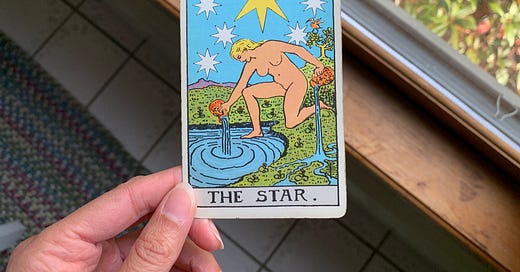Hi, hitting the like button is a great, free way to support Offerings. <3
A few years ago, I read Andy Fisher's Radical Ecopsychology which I’ve been thumbing through this week and resolving to re-read as soon as I can. Throughout the book—whose subtitle is Psychology in the Service of Life—Fisher draws on the work of psychotherapist Eugene Gendlin, who wrote a book called Focusing about a skill by the same name which Gendlin saw as crucial for change.
As I understand it, focusing is essentially a skill for relating to indeterminacy which is one of my new favorite words. For Gendlin, focusing involves “inward attention to what is at first sensed unclearly. Then it comes into focus and…changes in a bodily way.” When focusing, one “goes beneath the usual painful places to a bodily sensing that is at first unclear. The experience of something emerging from there feels like a relief and a coming alive.”
Gendlin believes that focusing yields a process of change that is "natural to the body” and that “feels that way in the body.” Through focusing, one makes contact with a kind of awareness that Gendlin describes as a “felt sense.” This felt sense is not just there waiting like a rock to be seen and acknowledged. Rather, it is something that forms when we learn how to allow it to form.
Gendlin writes:
"When it comes, it is at first unclear, fuzzy. By certain steps it can come into focus and also change. A felt sense is the body’s sense of a particular problem or a situation…something you do not at first recognize—it is vague and murky. It feels meaningful, but not known. It is a body-sense of meaning…The process brings change.”
That phrase “feels meaningful, but not known” is exactly how I would describe my personal experiences of grappling slowly and painstakingly with loss and transition. There is a sense of going through something crucial, a kind of crucible. But in the thick of those moments, the knowledge about where I’m going with it and why is elusive. Indeterminate.
So again what I appreciate about Gendlin’s focusing is that it outlines a way of relating to indeterminacy that can yield change that feels good. A way of being with indeterminacy, which is not only the stuff of grieving but the stuff of intimacy, and interacting with others on others' own terms, and world-loss and world-making.
A year and a half of somatic therapy has shown me just how vulnerable “focusing” on the body’s initially vague, inchoate and indeterminate sense of things without the foothold of a good story can be. There’s a real risk to be changed there, by what one allows space to emerge and attends to.
Anyway, I’m revisiting Gendlin because of a passage in Matthew Ratcliffe’s Grief Worlds, which describes one of my truest aspirations as a care worker and human:
Ratcliffe uses this passage to express the way that knowing an other involves being affected by their unique style, which is distinct from a set of fixed traits. In this case, for instance, it is not just that someone is a good listener but that the style in which they listen impacts and enhances what's most meaningful to the speaker in ways neither could have predicted.
However close we may be, we can never know an other as thoroughly or completely as we tend to believe that we do. Because style is living and breathing, it makes way for the indeterminacy of close relating. Others can surprise us not only with their own disclosures but in the ways they respond carefully to ours. In ways that can enhance, thicken, and bring to life those things we care most about.
To further illustrate the point about indeterminacy in relationship, Ratcliffe draws on writer C.S. Lewis’ famous grief journals which he wrote after the death of his wife, writer Joy Davidman. Lewis writes, “the most precious gift that marriage gave me was this constant impact of something very close and intimate yet all the time unmistakably other, resistant—in a word, real.”
The point about indeterminacy in relationships ties in with a larger theme of Grief Worlds which is anticipation. Recalling philosopher Maurice Merleau-Ponty’s ideas on bereavement, Ratcliffe notes that the way we come to understand someone significant has gone is through the experience of feeling their absence where we’d come to expect their response.
After a significant loss, people may avoid thwarted expectations by orienting away from circumstances that would invite the pain such confrontations entail. But the world that is preserved by steering clear the pain of those experiences, Ratcliffe argues, “is painfully lacking.”
That openness to being changed, that dynamism, that indeterminacy that characterizes relational intimacy, that allowing ourselves to be changed by real encounters with real others—including their real absences—has been interrupted. And with that shutting down, one’s world is “bereft of a more usual openness to certain kinds of future possibilities.”
In a grief context, I think this means that in refusing the pain of confrontation with absence where one had come to expect a response, the griever blocks the possibility of coming into a new, adaptive, and potentially generative sort of relationship with those who are no longer there.





